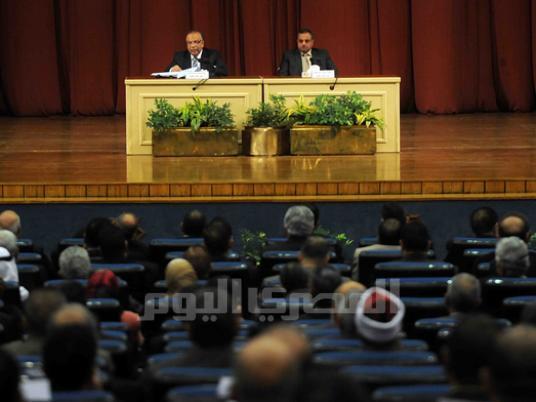
Egypt's Islamist-dominated Parliament began a session on Saturday to elect the 100-person assembly that will draft the new constitution, amid widespread anger among the country's secularists.
This is the third time members of Parliament’s lower and upper houses have met, and they will elect the constituent assembly’s members, of whom 35 members will come from the People’s Assembly and 15 from the Shura Council.
Another 50 members will be elected from outside Parliament. Thirty-five will be from institutions, syndicates, unions, Al-Azhar and the Coptic Church. Fifteen will be public figures.
Last Saturday, the Parliament’s two chambers voted overwhelmingly in favor of a suggestion by the Muslim Brotherhood's Freedom and Justice Party (FJP) that 50 members of the constituent assembly be from Parliament and the remaining 50 include legal and constitutional experts and union members.
Secular groups wanted to limit the number of lawmakers in the assembly, saying that would ensure better representation of all the political and social forces in Egypt's society.
Hundreds protested on Friday in front of Cairo's High Court to announce their rejection of the agreed-on constituent assembly makeup, which they say will allow Parliament’s Islamist majority to dominate the assembly.
Other political figures raised concerns about the makeup of the panel.
On Monday Minister of Solidarity and Domestic Trade Gouda Abdel Khaleq criticized the Islamist-dominated Parliament for trying to control the constitution-drafting process.
Presidential hopeful Hamdeen Sabbahi, from the Karama Party, demanded that all the members be non-parliamentarians.
In a statement issued on Friday, the Adl Party criticized the assembly's makeup, saying it does not serve national interest.
The party said the current plan is defective since it “marginalizes major national powers and factions.”
Debates over the new constitution have centered on three controversial issues: the balance of power between the next president and the Parliament, political supervision of the armed forces, and the role of Sharia and the identity of the state.
The constituent assembly will decide the extent of presidential powers. Parliament wants to curb these powers and give itself the right to appoint the government and withdraw confidence from it.
Ever since the first parliament after the 1952 revolution, the president has been the only one who can appoint or discharge ministers.
Currently, Egypt's de facto leader Field Marshal Hussein Tantawi is exercising the presidential right to appoint the cabinet.
The constitution will also outline the future political role of the military, which took power after former President Hosni Mubarak stepped down last year.
The third issue is whether to change key wording about the role of Islam in the government. The current language says the state religion is Islam and the principles of Islamic Sharia law are the main source of legislation.




